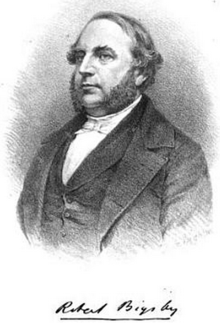Robert Bigsby

Robert Bigsby (11 April 1806 - 27 September 1873) was an English antiquarian and author.[1]
Bigsby was born in Castle Gate, Nottingham in 1806, son of Robert Bigsby, the registrar of the archdeaconry of Nottingham.[2] His father had visited the United States in 1787 where he had often been the guest of George Washington.[1] He was educated at Repton School during the headmastership of William Boultbee Sleath, and originally intended to become a lawyer. However, he turned to the study of antiquities and in particular to collecting memorabilia of Sir Francis Drake, the famous navigator of the Elizabethan era.[2] He had inherited Drake's astrolabe, and in 1831 he presented the instrument to King William IV, who in turn presented it to Greenwich Hospital.[1] He presented other relics of Drake to the British Museum.[2]
Bigsby was awarded an honorary LLD by the University of Glasgow, became a member of several foreign literary societies, was voted a Fellow of the Society of Antiquaries and in 1837 a Fellow of the Royal Society (although ejected in 1845 for non-payment) and became secretary and registrar of the English "Langue" of the Knights Hospitaller.[2] He was a prolific author, writing poetry and drama but mainly concentrating on antiquarian subjects, publishing sixteen books and many articles in magazines and reviews.
Bigsby was elected a member of the American Antiquarian Society in 1851.[3]
He died on 27 September 1873 at Peckham Rye, aged 67.[1]
Bibliography
- Robert Bigsby (1839). The Triumph of Drake, or the Dawn of England's Naval Power, a Poem.
- Robert Bigsby (1842). Miscellaneous Poems and Essays. Whittaker & Co.
- Robert Bigsby (1848). Visions of the Times of Old, or the Antiquarian Enthusiast.
- Robert Bigsby (1850). Boldon Delaval, a Love Story; My Cousin's Story; The Man on the Grey Horse.
- Robert Bigsby (1850). Dr. Bigsby and the Evangelicals, a Vindication of Boldon Delavel.
- Robert Bigsby (1850). A Supplement to the Rev. Jos. Jones's Appendix to the Vindication of Boldon Deleval.
- Robert Bigsby (1851). Old Places Revisited, or The Antiquarian's Enthusiast. C. Wright.
- Robert Bigsby (1853). Scraps from my Note-Book, or Gleanings of Curious Facts connected with the Family - History of D-shire.
- Robert Bigsby (1853). Ombo, a Dramatic Romance in twelve acts, with an historical introduction and notes.
- Robert Bigsby (1854). Historical and Topgraphical Description of Repton, in the County of Derby. Woodfall and Kinder.
- Robert Bigsby. Remarks on the Expediency of founding a National Institution of Literature.
- Robert Bigsby (1864). Irminsula, or the Great Pillar, a mythological research.
- Robert Bigsby (1866). A Tribute to the Memory of Scanderbeg the Great.
- Robert Bigsby (1867). National Honous and their Noblest Claimants.
- Robert Bigsby (1869). Mempir of the Order of St John of Jerusalem from the Capitulation of Malta till 1798.
- Rev. Samuel Fox (1872). Robert Bigsby, ed. History and Antiquities of the Parish Church of St. Matthew, Morley, in the County of Derby.
References
- 1 2 3 4
 Stephen, Leslie, ed. (1886). "Bigsby, Robert". Dictionary of National Biography. 5. London: Smith, Elder & Co. p. 27.
Stephen, Leslie, ed. (1886). "Bigsby, Robert". Dictionary of National Biography. 5. London: Smith, Elder & Co. p. 27. - 1 2 3 4 George Henry Townsend, ed. (1868). "Bigsby, Robert, LLD, FRS, FSA". Men of the time: a dictionary of contemporaries, containing biographical notices of eminent characters of both sexes. G. Routledge and sons. p. 77.
- ↑ American Antiquarian Society Members Directory